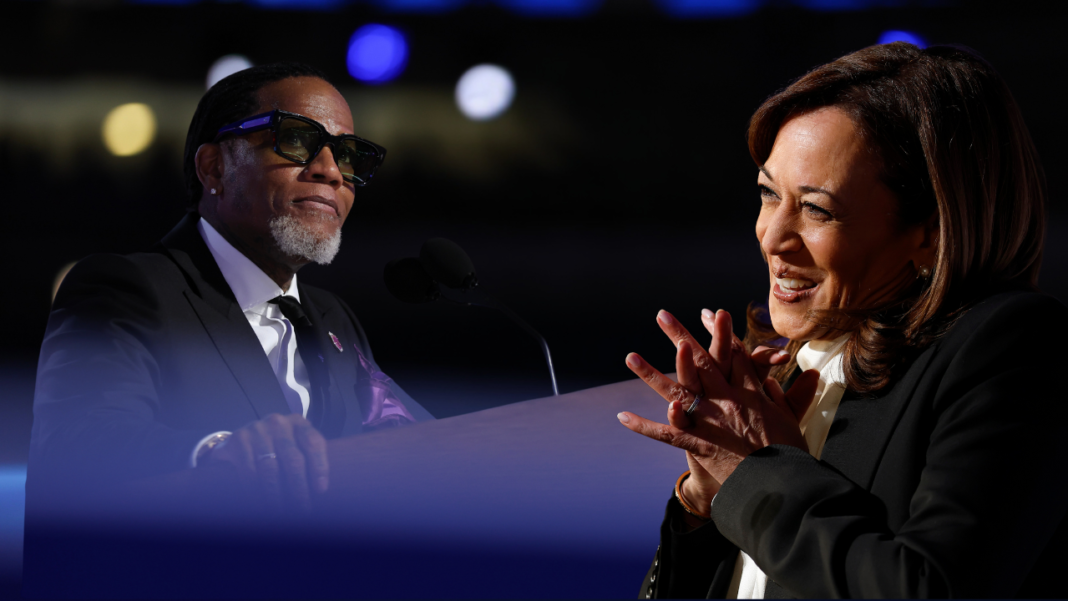The Power of Apology: Kamala Harris and DL Hughley’s Unlikely Exchange
It’s often said that actions speak louder than words, but sometimes, words themselves can become transformative, particularly when those words hold the weight of sincerity and vulnerability. One such instance occurred during the intense and scrutinized 2024 presidential campaign of former Vice President Kamala Harris. In a revealing moment on Scott Evans’ show, “House Guest,” Harris shared how much the words “I’m sorry” from comedian DL Hughley meant to her, shedding light on the complexities of public perception and the need for accountability.
The Context of Misunderstanding
During her tenure as District Attorney in California, Kamala Harris attracted both admiration and criticism. Among this criticism was a narrative perpetuated by Hughley, who mistakenly suggested that Harris had played a role in the incarceration of numerous Black men. This narrative, grounded in assumption rather than fact, found its way into public discourse, impacting Harris’s reputation and the broader conversation around criminal justice reform.
As the 2024 Democratic National Convention unfolded, Hughley took viewers by surprise when he publicly apologized for his previous statements about Harris. “As president, she will give each and every one of us a fair shot in life,” he began, later acknowledging that he did not always believe that truth. Hughley reflected on how, as a 15-year-old, he wouldn’t have fathomed supporting someone with a prosecutorial background. This self-assessment illustrates the journey from skepticism to understanding, emphasizing how preconceived notions can cloud judgment.
A Moment of Vulnerability
The most striking aspect of Hughley’s apology was the manner in which it took place. Recalling a pivotal visit to Harris’s home, he recounted how she encouraged him to conduct research instead of leaning on hearsay. “Imagine attacking someone’s character without a single Google search,” he expressed, highlighting the societal tendency to accept and amplify claims without verification. This moment of accountability not only conveyed humility but also signified a deep shift in perspective.
Hughley’s philosophy that “your apology should be as loud as your accusation” resonates on multiple levels. It advocates for a culture where voices responsible for spreading misinformation also bear the weight of correcting it. The magnitude of an apology, especially when given publicly, can mitigate the damage of false narratives, fostering a more empathetic public discourse.
Navigating Criticism with Faith
For Kamala Harris, public scrutiny is nothing new. Since breaking barriers as the first female vice president of the United States, she has been under a magnifying glass. However, during her conversation with Evans, Harris shared her perspective on managing relentless criticism. “I believe that God will judge us based on who we are and what we do,” she said. This profound assertion reflects her firm belief in resilience and self-identity amid external judgment.
Harris emphasized the importance of self-faith and the collective strength found within communities during challenging times. “We have to believe. We have to have faith in ourselves and each other,” she urged. This perspective invites individuals to look beyond the darkness of judgment and critique, reminding them that there is light within everyone that can lead to understanding and connection.
The Path Toward Understanding
The exchange between Harris and Hughley serves as a poignant reminder of the importance of taking responsibility for one’s words and actions. Public figures, like all individuals, are susceptible to misconceptions and misinterpretations. Yet, moments of honesty and accountability can herald a new era of understanding, moderation, and reconciliation.
In today’s world, where misinformation often spreads faster than the truth, the courage to apologize can lead to healing and restoration of trust. Whether in personal relationships or public dialogues, the ability to admit wrong and seek understanding paves the way for a more compassionate society.
The Ripple Effects of Apology
The impact of an apology extends beyond the immediate relationship between the offender and the offended. In public spheres, it serves to educate others about the importance of discernment in dialogue and commentary. By advocating for the truth and correcting misunderstandings, individuals can play a role in fostering a more informed and respectful public discourse.
Kamala Harris and DL Hughley’s exchange encapsulates more than just an apology—it represents a potential shift in societal attitudes toward accountability and understanding. In a landscape littered with projections and assumptions, their story stands as a compelling testament to the power of words when wielded with sincerity.



